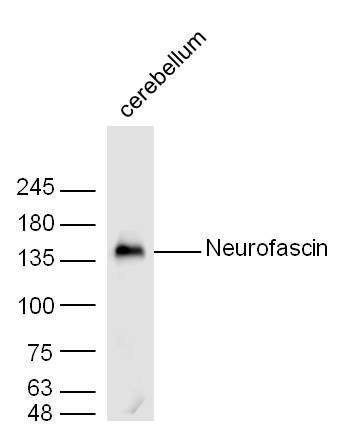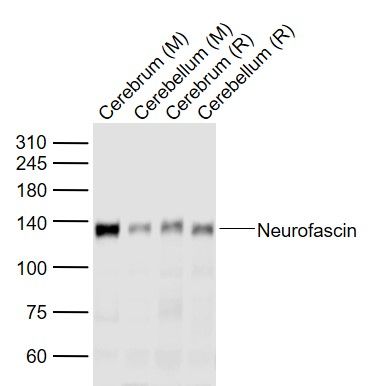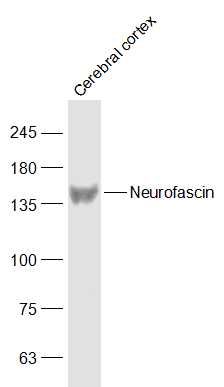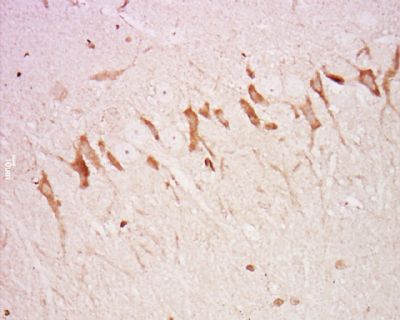上海细胞库
人源细胞系| 稳转细胞系| 基因敲除株| 基因点突变细胞株| 基因过表达细胞株| 重组细胞系| 猪的细胞系| 马细胞系| 兔的细胞系| 犬的细胞系| 山羊的细胞系| 鱼的细胞系| 猴的细胞系| 仓鼠的细胞系| 狗的细胞系| 牛的细胞| 大鼠细胞系| 小鼠细胞系| 其他细胞系|

| 规格 | 价格 | 库存 |
|---|---|---|
| 50ul | ¥ 1280 | 1 |
| 100ul | ¥ 1980 | 1 |
| 200ul | ¥ 2980 | 1 |
| 中文名称 | 神经束蛋白抗体 |
| 别 名 | KIAA0756; Neurofascin; Neurofascin homolog; NF; Nfasc; Nfasc protein; NFASC_HUMAN; NRCAML; neurofascin 155 kDa isoform; Neurofascin155. |
| 研究领域 | 神经生物学 |
| 抗体来源 | Rabbit |
| 克隆类型 | Polyclonal |
| 交叉反应 | Human, Mouse, Rat, (predicted: Chicken, Dog, Cow, Horse, ) |
| 产品应用 | WB=1:500-2000 ELISA=1:500-1000 IHC-P=1:100-500 IHC-F=1:100-500 ICC=1:100-500 IF=1:100-500 (石蜡切片需做抗原修复) not yet tested in other applications. optimal dilutions/concentrations should be determined by the end user. |
| 分 子 量 | 132/150kDa |
| 细胞定位 | 细胞膜 |
| 性 状 | Liquid |
| 浓 度 | 1mg/ml |
| 免 疫 原 | KLH conjugated synthetic peptide derived from human Neurofascin-155:501-650/1347 |
| 亚 型 | IgG |
| 纯化方法 | affinity purified by Protein A |
| 储 存 液 | 0.01M TBS(pH7.4) with 1% BSA, 0.03% Proclin300 and 50% Glycerol. |
| 保存条件 | Shipped at 4℃. Store at -20 °C for one year. Avoid repeated freeze/thaw cycles. |
| PubMed | PubMed |
| 产品介绍 | Neurofascin is a cell adhesion molecule involved in mediating axon recognition but also signaling axonal contact. Immunoglobulin domain cell adhesion molecule (cam) subfamily; members are components of neural cell adhesion molecules (N-CAM L1), Fasciclin II and the insect immune protein Hemolin. The subfamily also includes receptor domains such as as the extracelluar ligand binding domain of Fibroblast Growth Factor Receptor 2. Members are phylogenetically diverse, occuring throughout metazoa, and are not components of the adaptive immune system molecules found in jawed vertebrates. A predominant feature of most Ig domains is a disulfide bridge connecting 2 beta-sheets with a Trp packing against the disulfide bond. Function: Cell adhesion, ankyrin-binding protein which may be involved in neurite extension, axonal guidance, synaptogenesis, myelination and neuron-glial cell interactions. Subunit: Horseshoe-shaped homodimer. Subcellular Location: Cell membrane; Single-pass type I membrane protein. Similarity: Belongs to the immunoglobulin superfamily. L1/neurofascin/NgCAM family. SWISS: O94856 Gene ID: 23114 Database links: Entrez Gene: 23114 Human Entrez Gene: 269116 Mouse Entrez Gene: 116690 Rat Omim: 609145 Human SwissProt: O94856 Human SwissProt: Q810U3 Mouse SwissProt: P97685 Rat Unigene: 13349 Human Unigene: 326702 Mouse Unigene: 3048 Rat Important Note: This product as supplied is intended for research use only, not for use in human, therapeutic or diagnostic applications. 神经生物学相关蛋白(Neurobiology) |
| 产品图片 |  Sample: Cerebellum (Mouse) Lysate at 30 ug Sample: Cerebellum (Mouse) Lysate at 30 ugPrimary: Anti- Neurofascin Polyclonal (bs-0289R) at 1/300 dilution Secondary: IRDye800CW Goat Anti-Rabbit IgG at 1/20000 dilution Predicted band size: 132/150 kD Observed band size: 136 kD  Sample: Sample:Lane 1: Cerebrum (Mouse) Lysate at 40 ug Lane 2: Cerebellum (Mouse) Lysate at 40 ug Lane 3: Cerebrum (Rat) Lysate at 40 ug Lane 4: Cerebellum (Rat) Lysate at 40 ug Primary: Anti-Neurofascin (bs-0289R) at 1/1000 dilution Secondary: IRDye800CW Goat Anti-Rabbit IgG at 1/20000 dilution Predicted band size: 132 kD Observed band size: 132 kD  Sample: Sample:Cerebral cortex (Mouse) Lysate at 40 ug Primary: Anti-Neurofascin (bs-0289R) at 1/1000 dilution Secondary: IRDye800CW Goat Anti-Rabbit IgG at 1/20000 dilution Predicted band size: 132/150 kD Observed band size: 150 kD  Tissue/cell: Rat brain tissue; 4% Paraformaldehyde-fixed and paraffin-embedded; Tissue/cell: Rat brain tissue; 4% Paraformaldehyde-fixed and paraffin-embedded;Antigen retrieval: citrate buffer ( 0.01M, pH 6.0 ), Boiling bathing for 15min; Block endogenous peroxidase by 3% Hydrogen peroxide for 30min; Blocking buffer (normal goat serum,C-0005) at 37∩ for 20 min; Incubation: Anti-Neurofascin Polyclonal Antibody, Unconjugated(bs-0289R) 1:500, overnight at 4∑C, followed by conjugation to the secondary antibody(SP-0023) and DAB(C-0010) staining Tissue/cell: rat spinal cord tissue; 4% Paraformaldehyde-fixed and paraffin-embedded; Antigen retrieval: citrate buffer ( 0.01M, pH 6.0 ), Boiling bathing for 15min; Block endogenous peroxidase by 3% Hydrogen peroxide for 30min; Blocking buffer (normal goat serum,C-0005) at 37∩ for 20 min; Incubation: Anti-Neurofascin Polyclonal Antibody, Unconjugated(bs-0289R) 1:200, overnight at 4∑C, followed by conjugation to the secondary antibody(SP-0023) and DAB(C-0010) staining |